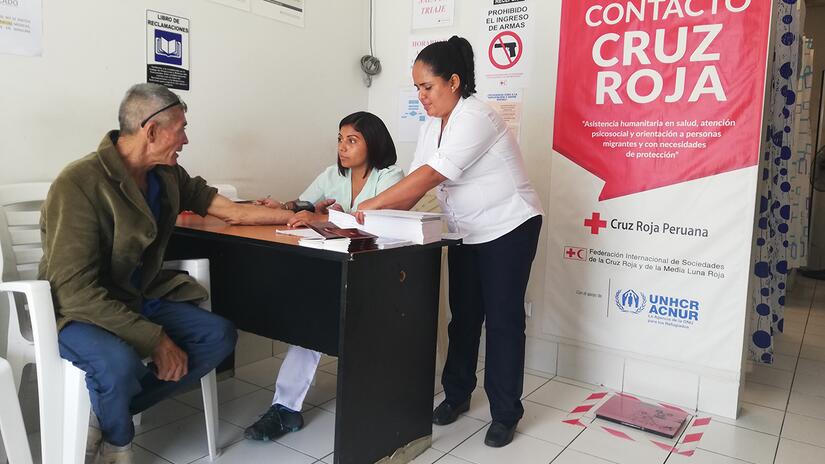“Medicine has been my passion since I was in high school” says Damarys Solano on the phone, while she's preparing to go out. Today she'll be giving medical attention at a shelter in Tumbes, where many migrants are following the mandatory isolation given in Peru due to the emergency of COVID-19.
Damarys was born in Tumbes, a city in the north of Peru, next to the frontier with Ecuador, and since she was very young she realized that there were many people with limitations to access to health services, and she wanted to do something about it, that is why she decided to study medicine. She completed her university studies in Cuba, and while at university she took part of the Student Health Brigade, to help people that didn't have easy access to the health system. And that passion continues with her today.
Dr. Solano works at the International Federation of Red Cross and Red Crescent Societies (IFRC) since September 2018, at the Red Cross Care Center at the Binational Border Assistance Center (CEBAF), in the border with Ecuador, placed in response to the increase in the number of migrants entering the country.
“The needs of migrants were increasing constantly, I had to think daily about what methods to use to not only alleviate their pain with medication, but also the emotional aspect, because sometimes just listening to them would take away their pain. For them, doing their journey by foot was very difficult, but they have been brave”, remark Dr. Solano, for whom helping anyone in need, regardless their nationality, race, religion, social condition or political beliefs, is one of the principles of her work, a principle she shares with IFRC and is one of the reasons why she decided to work here.
She remembers in a bittersweet way the different people she has seen through CEBAF, such as elderly patients who had made their journey on foot hoping to meet their family in Peru, or mothers who were traveling alone and that have gave birth shortly before, in one of the transit countries. “The Red Cross principle of humanity is something that you live and apply in the day-to-day work, with your patients. That makes a big difference.”, adds Damarys.
The migratory context changed over time, although migrants continued to enter trough CEBAF, the number of people who stayed in Tumbes city increased. The Care Center at CEBAF wasn't enough to meet the health needs of the vulnerable population, and this is how the Community Health Campaigns began to be implemented. Damarys remembers with great satisfaction the active participation of the population, both migrant and local, at the health campaigns which brought medical attention to more than 650 patients.
Today, in the context of COVID-19, many of the migrants who were waiting for a response at CEBAF have been transferred to shelters. That doesn't mean that Damarys rests; she, along with the rest of the team, continue to work, visiting the shelters, providing health care and treatment, ensuring that the patients are well, and monitoring their situation.
“I feel that all this experience has reinforced my feelings for medicine, since sometimes you think that you sit at a desk prescribing recipes to those in pain, and is not only that; is to relieve with the art of healing those who need us. To value life and to give them hope that not all is lost”, concludes Damarys.
Article
World Radio Day: How radio helps keep communities healthy and safe
World Radio Day: How radio helps keep communities healthy and safe
| Article

